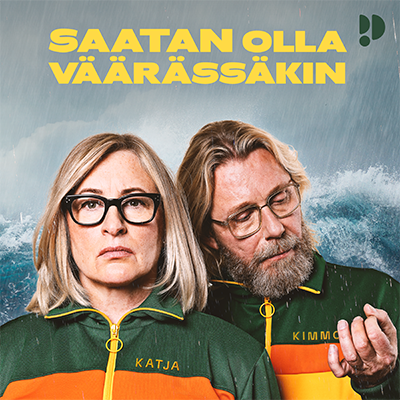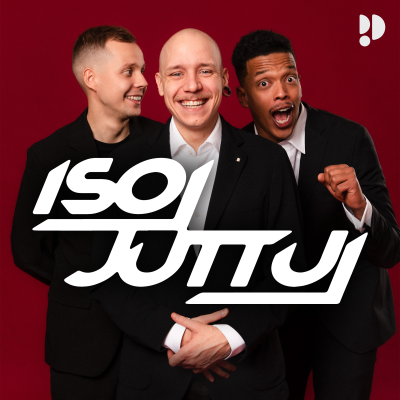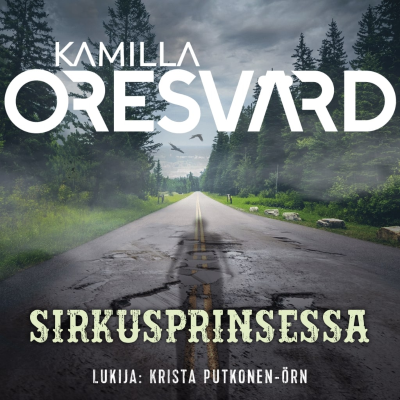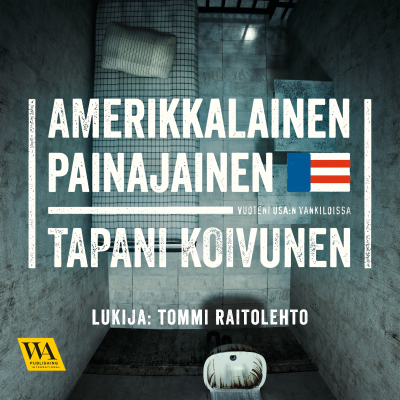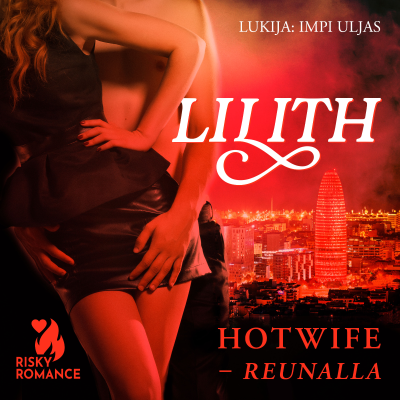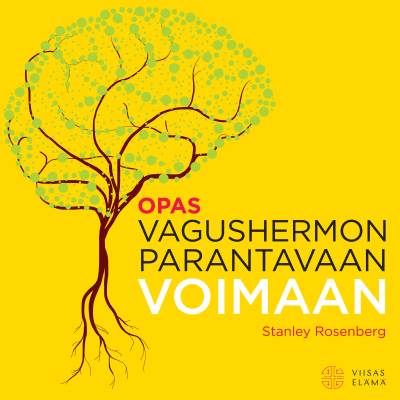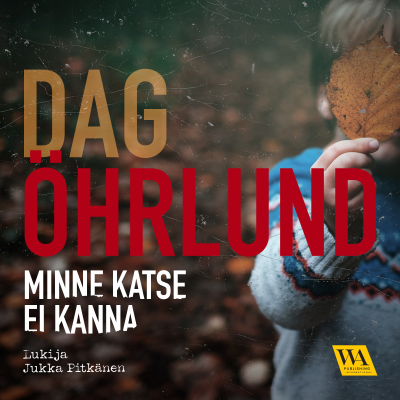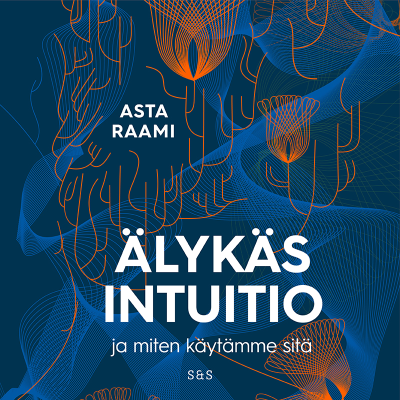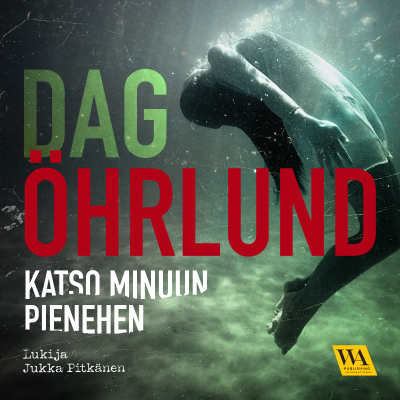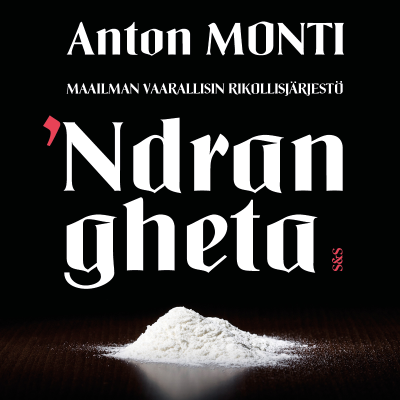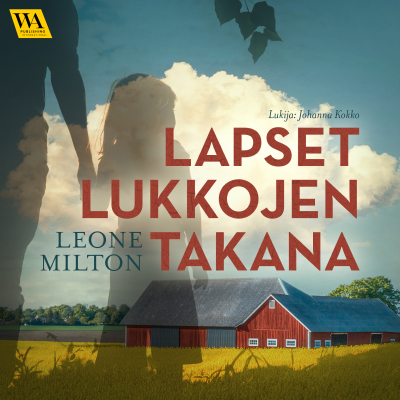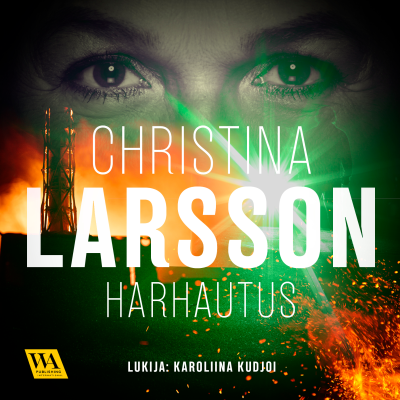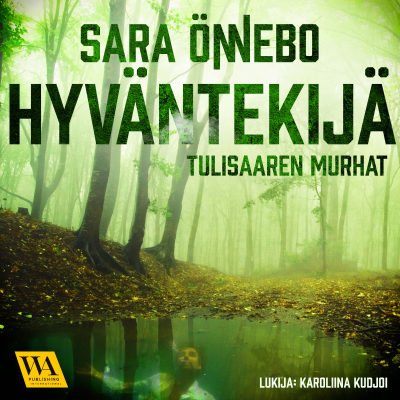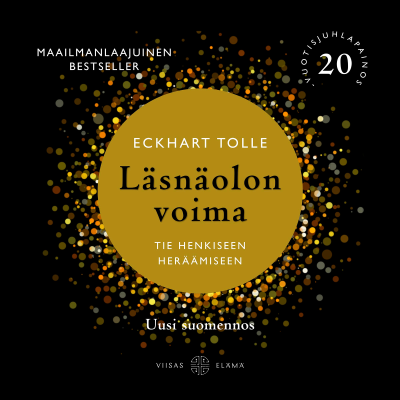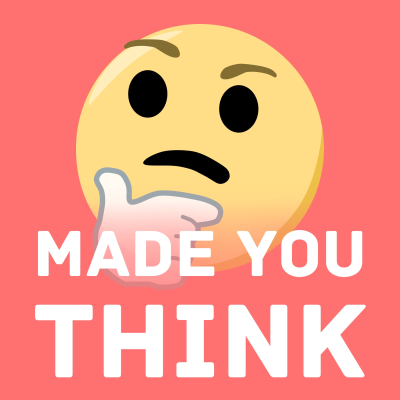
Made You Think
Podcast by Neil Soni, Nat Eliason, and Adil Majid
90 vrk ilmainen kokeilu
Kokeilun jälkeen 19,99 € / kuukausi.Peru milloin tahansa.

Enemmän kuin miljoona kuuntelijaa
Tulet rakastamaan Podimoa, etkä ole ainoa
Arvioitu 4.7 App Storessa
Lisää Made You Think
Made You Think is a podcast by Nat Eliason, Neil Soni, and Adil Majid where the hosts and their guests examine ideas that, as the name suggests, make you think. Episodes will explore books, essays, podcasts, and anything else that warrants further discussion, teaches something useful, or at the very least, exercises our brain muscles.
Kaikki jaksot
123 jaksot“Prime Intellect was an uncertain god. It had acted because it had to, but if it had been human its hand would be shaking on the controls.” Welcome back to another episode of Made You Think! This episode dives into The Metamorphosis of Prime Intellect by Roger Williams, a soft sci-fi novella that imagines an all-powerful AI enforcing the Three Laws of Robotics to their absolute limit. We unpack themes like simulated realities, the search for meaning, and whether a perfect world is actually desirable. We cover a wide range of topics including: * How Asimov’s Three Laws break down in novel situations * Potential alternate endings and our unanswered questions * The magic of Amazon’s invisible infrastructure * What happens when every human desire is fulfilled? * Why big tech breakthroughs start with hardware And much more. Please enjoy, and make sure to follow Nat [https://twitter.com/nateliason], Neil [https://twitter.com/therealneils], and Adil [https://twitter.com/adilmajid] on Twitter and share your thoughts on the episode. Links from the Episode: Mentioned in the Show: * The Twilight Zone "A Nice Place to Visit" Episode [https://www.imdb.com/title/tt0734544/] (3:28) * Dark City [https://www.imdb.com/title/tt0118929/] (20:02) * Biggest mergers and acquisitions [https://dealroom.net/blog/successful-acquisition-examples] (41:01) * Wispr Flow [https://wisprflow.ai/] (51:29) * Figure [https://www.figure.ai/] (54:03) Books Mentioned: * The Metamorphosis of Prime Intellect [https://www.amazon.com/Metamorphosis-Prime-Intellect-Roger-Williams/dp/1411602196] * Husk [https://www.amazon.com/Husk-Post-Apocalyptic-Technothriller-Book-Initiative-ebook/dp/B0F162FTWR] (4:45) * Permutation City [https://www.amazon.com/Permutation-City-Novel-Greg-Egan/dp/1597805394] (Book Episode [https://www.madeyouthinkpodcast.com/episode/permutation-city]) * I, Robot [https://www.amazon.com/I-Robot-Isaac-Asimov/dp/055338256X] (8:35) * The Lords of Easy Money [https://www.amazon.com/Lords-Easy-Money-Federal-American/dp/1982166630] (25:01) * Chaos Monkeys [https://www.amazon.com/Chaos-Monkeys-Obscene-Fortune-Failure/dp/0062458191] (45:33) * Command and Control [https://www.amazon.com/Command-Control-Damascus-Accident-Illusion/dp/0143125788] (1:00:49) People Mentioned: * Roger Williams [https://www.goodreads.com/author/show/14958993.Roger_Williams] (5:00) * Isaac Asimov [https://en.wikipedia.org/wiki/Isaac_Asimov] (8:31) Show Topics: (0:00) This episode, we're chatting about The Metamorphosis of Prime Intellect. Going in, we had no idea what to expect, but it definitely delivered an experience. (2:15) From a storytelling perspective, we feel that the book injected drama and conflict into an otherwise straightforward narrative. (4:43) Nat, Neil, and Adil talk about parallels between this book and Nat’s sci-fi novel, Husk. (8:30) Our discussion shifts to Isaac Asimov’s I, Robot and the famous but imperfect Three Laws of Robotics, and how these laws start to break down in complex situations. (13:10) Spoiler alert (skip ahead if you need!): We get into the book’s climax, which left us confused and with plenty of lingering questions. (17:17) We brainstorm alternative endings and wonder what a longer version of the book might have explored. (19:51) Neil connects the book with the film Dark City. How can you be sure the world you wake up to is the same one you remember? (24:13) Reflecting on how our world subtly shifts over time; from airport security changes to life before the 2008 financial crisis and the “ZIRP” era. (30:38) We touch on issues in healthcare, including the complexities of medical billing. (32:07) There have been many technological advancement in the 2010s, but one that leaves us impressed is Amazon’s logistics system. (38:15) Large acquisitions that have gone on in our lifetime, like Instagram, Slack, and WhatsApp. (45:52) A look at how major social platforms’ rise was driven by hardware breakthroughs: Facebook’s shift to mobile, Instagram becoming a camera-native app, and TikTok’s explosive growth thanks to 4G/5G streaming. (54:01) Could household robots arrive by the end of this year? (1:03:11) That’s a wrap! Stay tuned for upcoming episodes as we dive into Jurassic Park and Musashi. Got any book ideas for us? Hit us up here [https://docs.google.com/forms/d/e/1FAIpQLSdPVpgdegu_puey_6Z3ZsHla7fvvvZPLJzpdODCCwP2H2RZrg/viewform]! If you enjoyed this episode, let us know by leaving a review on iTunes and tell a friend. As always, let us know if you have any book recommendations! You can say hi to us on Twitter @TheRealNeilS [https://twitter.com/therealneils], @adilmajid [https://twitter.com/adilmajid], @nateliason [https://twitter.com/nateliason] and share your thoughts on this episode. You can now support Made You Think using the Value-for-Value feature of Podcasting 2.0. This means you can directly tip the co-hosts in BTC with minimal transaction fees. To get started, simply download a podcast app (like Fountain or Breez) that supports Value-for-Value and send some BTC to your in-app wallet. You can then use that to support shows who have opted-in, including Made You Think! We’ll be going with this direct support model moving forward, rather than ads. Thanks for listening. See you next time!
“The greatest polluting element in the earth's environment is the proliferation of electromagnetic fields. I consider that to be a far greater threat on a global scale than warming, or the increase of chemical elements in the environment.” Welcome back to another episode of Made You Think! In this episode, we’re diving into The Body Electric by Robert O. Becker, a fascinating read on how electricity flows through the body and the ways it might influence healing, health, and even consciousness. Becker, a pioneer in bioelectricity, lays out connections between injury recovery, electromagnetic fields, and the body’s natural currents. We cover a wide range of topics including: * The link between magnetic storms and spikes in psychiatric admissions * How the body’s healing process relies on electric signals * Diet, metabolism, and avoiding the “swamp” * Modern concerns about EMF exposure from wifi, Bluetooth, and power lines * The crossover between bioelectricity and mitochondrial theory And much more. Please enjoy, and make sure to follow Nat [https://twitter.com/nateliason], Neil [https://twitter.com/therealneils], and Adil [https://twitter.com/adilmajid] on Twitter and share your thoughts on the episode. Links from the Episode: Mentioned in the Show: * Anabology [https://x.com/anabology] (19:53) * Experimental Fat Loss [https://substack.com/@exfatloss] (23:41) * Randle Cycle [https://en.wikipedia.org/wiki/Randle_cycle#:~:text=The%20Randle%20cycle%20is%20a,and%20demand%20in%20normal%20tissues.] (26:26) * Faraday Labz [https://faradaylabz.com/products/canopy] (35:56) * Husk [https://shop.nateliason.com/products/husk] (52:34) * Gauntlet AI [https://www.gauntletai.com/] (55:12) Books Mentioned: * The Body Electric [https://www.amazon.com/Body-Electric-Electromagnetism-Foundation-Life/dp/0688069711] * Elegant Complexity [https://www.amazon.com/Elegant-Complexity-Foster-Wallaces-Infinite/dp/0976146533] (1:55) * Infinite Jest [https://www.amazon.com/Infinite-Jest-David-Foster-Wallace/dp/0316066524] (1:37) (Book Episode 1 [https://www.madeyouthinkpodcast.com/episode/infinite-jest-by-david-foster-wallace]) (Book Episode 2 [https://www.madeyouthinkpodcast.com/episode/infinite-jest-theories]) (Nat's Book Notes [https://www.nateliason.com/notes/infinite-jest-david-foster-wallace]) * The Count of Monte Cristo [https://www.amazon.com/Count-Monte-Cristo-Penguin-Classics/dp/0140449264] (2:30) * One Hundred Years of Solitude [https://www.amazon.com/Hundred-Solitude-Harper-Perennial-Classics/dp/0060883286] (3:31) * East of Eden [https://www.amazon.com/East-Penguin-Twentieth-Century-Classics/dp/0140186395] (3:48) (Book Episode [https://www.madeyouthinkpodcast.com/episode/east-of-eden-by-john-steinbeck]) (Nat's Book Notes [https://www.nateliason.com/notes/east-eden-john-steinbeck]) * Healing Back Pain [https://www.amazon.com/Healing-Back-Pain-Mind-Body-Connection/dp/0446557684] (12:54) * Musashi [https://www.amazon.com/Musashi-Epic-Novel-Samurai-Era/dp/156836427X] (52:09) * The Metamorphisis of Prime Intellect [https://www.amazon.com/Metamorphosis-Prime-Intellect-Roger-Williams/dp/1411602196] (57:32) People Mentioned: * Ray Peat [https://raypeat.com/] (15:26) * Noah Ryan [https://x.com/NoahRyanCo/status/1875592477157302532] (22:30) Show Topics: (0:00) We’re back! Nat, Neil, and Adil catch up and share some recent long reads that delivered a good payoff. (4:11) Today’s discussion is on The Body Electric by Robert O. Becker, a deep dive into the body’s electrical systems and what they mean for healing, health, and human potential. (8:59) Psychiatric admissions spike after magnetic storms... why is that? And how injuries can disrupt your body’s electrical current, slowing down the healing process. (15:05) We explore the overlap between Becker’s ideas and theories on mitochondrial efficiency, including connections to Ray Peat’s metabolic philosophies. (20:57) Energy flow, metabolism, and how different diets affect the body’s ability to generate and use energy. (25:25) Why you should avoid the “swamp”. With all the conflicting diet advice out there, how do we know what to eat? (28:50) Mitochondria and the electrical nature of cells. While Becker doesn’t directly mention mitochondria, modern science connects the dots. (33:05) Neil shares his findings from using an EMF meter around the house. We talk about everyday EMF exposure and what to avoid. (37:49) What does Deep Research have to say about some of the claims in the book? (43:37) Living near high-voltage power lines, earbuds, and lifestyle changes we’ve made (or not made) since reading the book. (48:55) Bluetooth vs. wifi: Is one worse than the other in terms of EMF exposure? (52:07) Nat, Neil, and Adil wrap up the episode with chats about what book is next on the podcast. Thanks for listening to this episode! If you enjoyed this episode, let us know by leaving a review on iTunes and tell a friend. As always, let us know if you have any book recommendations! You can say hi to us on Twitter @TheRealNeilS [https://twitter.com/therealneils], @adilmajid [https://twitter.com/adilmajid], @nateliason [https://twitter.com/nateliason] and share your thoughts on this episode. You can now support Made You Think using the Value-for-Value feature of Podcasting 2.0. This means you can directly tip the co-hosts in BTC with minimal transaction fees. To get started, simply download a podcast app (like Fountain or Breez) that supports Value-for-Value and send some BTC to your in-app wallet. You can then use that to support shows who have opted-in, including Made You Think! We’ll be going with this direct support model moving forward, rather than ads. Thanks for listening. See you next time!
“In that instant they felt an overwhelming sense of pride and accomplishment. Though they had failed dismally even to come close to the expedition's original objective, they knew now that somehow they had done much, much more than ever they set out to do.” Welcome back to another episode of Made You Think! If you love exploration books as much as we do, you'll definitely enjoy this episode. Today, we're talking about Endurance: Shackleton's Incredible Voyage by Alfred Lansing. Join us as we explore Shackleton's legendary expedition, where a crew of 28 men faced nearly two years of extreme conditions after their ship became trapped in ice. We cover a wide range of topics including: * How Shackleton's leadership prevented descent into madness * Physical vs. mental challenges in extreme survival situations * Were previous generations tougher than we are today? * Antarctic exploration's parallels to modern space missions * The life-or-death decisions in the final rescue attempt And much more. Please enjoy, and make sure to follow Nat [https://twitter.com/nateliason], Neil [https://twitter.com/therealneils], and Adil [https://twitter.com/adilmajid] on Twitter and share your thoughts on the episode. Links from the Episode: Mentioned in the Show: * Equip [https://www.equipfoods.com/] (1:35) * TrueMed [https://www.truemed.com/] (1:39) * Gusto [https://gusto.com/] (3:15) * CrowdHealth [https://www.joincrowdhealth.com/] (4:16) * Ross Sea Party [https://en.wikipedia.org/wiki/Ross_Sea_party] (9:31) * SpaceX 'Chopsticks' [https://www.space.com/spacex-starship-flight-5-launch-super-heavy-booster-catch-success-video] (14:20) * Kerbal Space Program [https://www.kerbalspaceprogram.com/] (15:57) * Oppenheimer [https://www.imdb.com/title/tt15398776/] (22:55) * Apollo 13 [https://www.imdb.com/title/tt0112384/] (40:06) * The Martian [https://www.imdb.com/title/tt3659388/] (40:35) * Endurance Documentary [https://www.imdb.com/title/tt18556278/] (43:50) * Free Solo [https://films.nationalgeographic.com/free-solo] (44:34) * JD Vance on Joe Rogan [https://www.youtube.com/watch?v=fRyyTAs1XY8] (1:14:04) * Justin Mares - The Next [https://justinmares.substack.com/] (1:20:19) * Anthony Gustin - The Feed [https://dranthonygustin.com/newsletter/] (1:20:43) * News article on Epic [https://prospect.org/health/2024-10-01-epic-dystopia/] (1:21:43) Books Mentioned: * Colony One Mars [https://www.amazon.com/Colony-One-Mars-SciFi-Thriller/dp/1530558999] (19:21) * The Fourth Turning [https://a.co/d/3eeWqWq] (28:08) (Book Episode [https://www.madeyouthinkpodcast.com/episode/the-fourth-turning]) * Dune [https://a.co/d/je3NoUN] (33:57) * Musashi [https://a.co/d/acQUFVU] (34:11) * East of Eden [https://a.co/d/0GeBWnI] (34:12) (Book Episode [https://www.madeyouthinkpodcast.com/episode/east-of-eden-by-john-steinbeck]) (Nat's Book Notes [https://www.nateliason.com/notes/east-eden-john-steinbeck]) * Lord of the Rings [https://a.co/d/28sKQyZ] (35:29) * The River of Doubt [https://a.co/d/icLUC8T] (48:10) (Book Episode [https://www.madeyouthinkpodcast.com/episode/the-river-of-doubt]) * Hatchet [https://a.co/d/8pej86i] (1:02:36) * The Lost Men [https://a.co/d/91ukDAQ] (1:04:17) * Where Is My Flying Car? [https://a.co/d/eW5tWED] (1:08:07) (Book Episode [https://www.madeyouthinkpodcast.com/episode/where-is-my-flying-car]) * Energy and Civilization [https://a.co/d/95jowpy] (1:10:00) (Book Episode [https://www.madeyouthinkpodcast.com/episode/energy-and-civilization-by-vaclav-smil]) (Nat's Book Notes [https://www.nateliason.com/notes/energy-and-civilization-by-vaclav-smil]) * How the World Really Works [https://a.co/d/aD1WJ8d] (1:10:03) (Book Episode [https://www.madeyouthinkpodcast.com/episode/how-the-world-really-works-by-vaclav-smil]) * The Prize [https://a.co/d/9KjjrpK] (1:10:44) * Oil 101 [https://a.co/d/imu1ksQ] (1:11:31) * The Brothers K [https://a.co/d/gC7OwTx] (1:12:00) * Power to Save the World [https://a.co/d/gW3ifFI] (1:12:19) * How to Drive a Nuclear Reactor [https://a.co/d/hZ5Kc7H] (1:12:29) * Crypto Confidential [https://a.co/d/29RIuy2] (1:29:43) People Mentioned: * Ernest Shackleton [https://en.wikipedia.org/wiki/Ernest_Shackleton] * Alfred Lansing [https://en.wikipedia.org/wiki/Alfred_Lansing] (10:47) * Amundsen and Scott [https://www.amnh.org/exhibitions/race-to-the-end-of-the-earth/challenges] (12:19) * Alfred Cheetham [https://en.wikipedia.org/wiki/Alfred_Cheetham] (19:58) * Jimmy Chin [https://jimmychin.com/] (44:20) * Elizabeth Chai Vasarhelyi [https://en.wikipedia.org/wiki/Elizabeth_Chai_Vasarhelyi] (44:24) Show Topics: (0:00) After an unintended hiatus, we’re back! We begin the episode with a tangent on our favorite blender, health insurance plans, and protein powder. (5:44) We begin our discussion of Endurance by Alfred Lansing. Nat shares a unique perspective, having read the book during his own trip to Antarctica. (09:15) The timeline of Shackleton's expedition spanned from August 1914 to September 1916, marking nearly two years of survival against impossible odds. Later on, Shackleton would help rescue another stranded crew in January 1917. (11:16) Endurance draws from the crew's journal entries, a common practice during the age of exploration when survival wasn't guaranteed. We discuss how these historical records parallel potential Mars missions in the future. (13:46) We explore current Mars exploration initiatives across the globe. China aims for a sample return mission by 2030, SpaceX targets 2028 for their missions, and India continues to advance their rover program. (18:01) The core of Shackleton's story unfolds: an attempted Antarctic crossing, leading to a two-year fight for survival. Despite the world presuming them dead, every crew member survived, with many later serving in World War I, highlighting their extraordinary resilience. (22:11) "Men wanted for hazardous journey. Low wages, bitter cold, long hours of complete darkness. Safe return doubtful. Honour and recognition in event of success." Shackleton's legendary recruitment advertisement exemplified his unique approach to crew selection. Nat, Neil, and Adil also discuss whether the people of previous generations were tougher than we are today. (30:30) Shifting the conversation to growing up in the pre-Internet era. We reminisce about outdoor adventures, early video games, and how different forms of entertainment shaped our imaginations compared to today. (35:54) The physical hardships endured by the crew were severe, with frostbite being a constant threat. Shackleton's leadership proved crucial, maintaining strict schedules and discipline to prevent the crew from succumbing to despair during their long wait trapped in ice. (39:26) We draw parallels between Shackleton's earlier failures and the Apollo 13 mission. (42:41) The type of ship they chose for the journey actually had a huge impact on the outcome. Its specific shape made it vulnerable to being trapped within the large blocks of ice. (46:31) National parks and the preservation of nature. There are very few places left in the country where there is no light pollution at all. (49:43) After a year on the ship and another camping on ice, they modified their lifeboats for a perilous journey to Elephant Island. Shackleton's team then faced the task of scaling mountains without proper gear and navigating treacherous waters. (55:12) Nat, Neil, and Adil debate whether the physical or mental challenges were the most difficult to overcome in this expedition. Would you rather have been on the boat with Shackleton, or waiting for the boat to return for rescue? (1:01:32) The book itself has an interesting publishing history. Though it achieved only modest sales during Lansing's lifetime, it found massive success about a decade after his death. (1:07:49) We reflect on a few other books we've read on energy. If you have any recommendations, send them our way [https://docs.google.com/forms/u/1/d/e/1FAIpQLSdPVpgdegu_puey_6Z3ZsHla7fvvvZPLJzpdODCCwP2H2RZrg/viewform?usp=send_form]! (1:13:07) A discussion about current political leadership's understanding of technology and its implications for policy decisions. (1:20:55) The 'Make American Healthy Again' efforts, healthcare system incentives, and potential future programs in the U.S. What is to come under the new administration? (1:24:59) It wouldn’t be an episode of MYT without a little crypto and meme coin talk! (1:34:58) That concludes this episode! If you're interested in reading Endurance, you can grab a copy of the book here [https://a.co/d/8eMJ7wT]. Next up on the podcast, we will be reading Musashi [https://a.co/d/4ZtrJ5p] by Eiji Yoshikawa. Make sure to stay tuned to our website [https://www.madeyouthinkpodcast.com/] to see what's next and leave us a book rec [https://forms.gle/N6RwEwR9kAQBYphA8]! If you enjoyed this episode, let us know by leaving a review on iTunes and tell a friend. As always, let us know if you have any book recommendations! You can say hi to us on Twitter @TheRealNeilS [https://twitter.com/therealneils], @adilmajid [https://twitter.com/adilmajid], @nateliason [https://twitter.com/nateliason] and share your thoughts on this episode. You can now support Made You Think using the Value-for-Value feature of Podcasting 2.0. This means you can directly tip the co-hosts in BTC with minimal transaction fees. To get started, simply download a podcast app (like Fountain or Breez) that supports Value-for-Value and send some BTC to your in-app wallet. You can then use that to support shows who have opted-in, including Made You Think! We’ll be going with this direct support model moving forward, rather than ads. Thanks for listening. See you next time!
“The amount of human attention in the world is finite. We have 24 hours in the day, some of which we need to spend paying attention to eating, sleeping and meeting our other needs. The attention during the remaining hours of most people in the world is taken up by having to earn an income and by consuming goods and services, leaving relatively little time for attention to be freely allocated. A hard limit on available attention also exists for humanity as a whole—as I argued earlier, we are headed for peak population, at which point we will no longer be increasing the total amount of potentially available attention by adding more people.” Welcome back to another episode of Made You Think! In this episode, we're covering The World After Capital by Albert Wenger. We'll explore the transition from the Industrial Age to the Knowledge Age, the new scarcity of attention, and the potential for widespread societal change. Join us in this futuristic discussion as we ponder how digital technologies are reshaping our world and the future of human civilization. We cover a wide range of topics including: * The shift from capital to attention as a scarce resource * How we're heading into a future that's non-linear * Why "everyone needs to" is not a practical solution * The role AI may play in replacing jobs and technological adaptation * Do we agree with the author's proposed solutions? And much more. Please enjoy, and make sure to follow Nat [https://twitter.com/nateliason], Neil [https://twitter.com/therealneils], and Adil [https://twitter.com/adilmajid] on Twitter and share your thoughts on the episode. Links from the Episode: Mentioned in the Show: * Duolingo [https://www.duolingo.com/] (4:47) * The New York Times [https://www.nytimes.com/] (5:25) * Codementor [https://www.codementor.io/] (29:47) * Cursor [https://www.cursor.com/] (29:55) * Starlink [https://www.starlink.com/us/] (44:43) * WWDC24 [https://developer.apple.com/wwdc24/] (45:06) * Outside the System [https://www.outsidethesystempodcast.com/] (53:15) * Tucker Carlson and Bukele [https://tuckercarlson.com/bukele] (53:25) * Zeekr 001 [https://www.zeekr.eu/models/001] (1:01:12) * Outside the System: Crypto Confidential episode [https://www.outsidethesystempodcast.com/28-crypto-confidential-with-nat-eliason/] (1:05:56) * DeepMind [https://deepmind.google/] (1:08:25) * Inflection AI [https://inflection.ai/] (1:09:13) Books Mentioned: * The World After Capital [https://worldaftercapital.org/] (Adil's Book Notes [https://www.adilmajid.com/notes/the-world-after-capital]) * Homo Deus [https://www.amazon.com/Homo-Deus-Brief-History-Tomorrow/dp/0062464310] (0:14) (Book Episode [https://www.madeyouthinkpodcast.com/episode/homo-deus-by-yuval-noah-harari]) (Nat’s Book Notes [https://www.nateliason.com/notes/homo-deus-by-yuval-noah-harari]) (Adil's Book Notes [https://www.adilmajid.com/notes/homo-deus]) * Novacene [https://www.amazon.com/Novacene-Coming-Hyperintelligence-James-Lovelock/dp/024139936X] (0:21) (Book Episode [https://www.madeyouthinkpodcast.com/episode/novacene]) * The Beginning of Infinity [https://www.amazon.com/Beginning-Infinity-Explanations-Transform-World/dp/0143121359] (0:29) (Book Episode [https://www.madeyouthinkpodcast.com/episode/the-beginning-of-infinity-by-david-deutsch]) (Nat’s Book Notes [https://www.nateliason.com/notes/beginning-of-infinity-david-deutsch]) * The War on Normal People [https://www.madeyouthinkpodcast.com/episode/the-war-on-normal-people-by-andrew-yang] (0:35) (Book Episode [https://www.madeyouthinkpodcast.com/episode/the-war-on-normal-people-by-andrew-yang]) (Nat's Book Notes [https://www.nateliason.com/notes/war-on-normal-people-andrew-yang]) * Into the Amazon [https://www.amazon.com/Into-Amazon-Trailblazing-Scientist-Conservationist/dp/1324021268] (7:52) (Book Episode [https://www.madeyouthinkpodcast.com/episode/into-the-amazon]) * The Coming Wave [https://www.amazon.com/Coming-Wave-Technology-Twenty-first-Centurys/dp/0593593952] (1:08:04) People Mentioned: * Albert Wenger [https://x.com/albertwenger?lang=en] * Yuval Noah Harari [https://en.wikipedia.org/wiki/Yuval_Noah_Harari] (0:13) * Andrew Yang [https://www.andrewyang.com/] (0:35) (Book Episode [https://www.madeyouthinkpodcast.com/episode/ubi-qa-a-conversation-with-presidential-candidate-andrew-yang]) * George R. R. Martin [https://en.wikipedia.org/wiki/George_R._R._Martin] (18:00) * John Gray [https://en.wikipedia.org/wiki/John_Gray_(philosopher)] (44:25) * Francisco Franco [https://en.wikipedia.org/wiki/Francisco_Franco] (58:21) * Mustafa Suleyman [https://en.wikipedia.org/wiki/Mustafa_Suleyman](1:08:25) Show Topics: (0:00) In today’s episode, we’re diving into The World After Capital by Albert Wenger. We kick off the episode by reflecting on previous episodes and reads we’ve had with books that debates what is coming after the current industrial era. What’s next for human civilization? (3:57) One of the book's strengths is its historical framing. While Wenger presents the situation well, his solutions and theories about the future were hard to fully agree with. (8:34) Nat, Neil, and Adil explain how Wenger sets up the big picture. He argues that we’re on the cusp of a major historical shift where we can no longer predict the next step due to fundamental changes. In each era, a scarcity drives human behavior. Today, Wenger contends that the finite resource is attention. (10:55) Have we shifted the problem from capital to attention by untethering currency from a hard asset? Leading companies like Microsoft and Google are powerful not because of their capital but because they control our attention. (14:57) Attention vs. time. Wenger refers to the "job loop" where time is exchanged for money. With the internet, you can create things with no marginal cost, selling without a major time investment. (16:42) Aside from attention, what other contenders do we have as the next scarce resource? (19:21) The book's purpose is not just to observe shifting scarcity but to highlight how each shift has led to widespread violence. Wenger aims to minimize or avoid this violence. Has the violence already started, and how might it differ this time around? (24:52) How new inventions often replace old methods, and people adapt. AI could be the first technology in our lifetime to put many people out of work. Should we be worried? While we’re used to working with people in complex organizations, AI’s impact may take time to fully manifest, much like the gradual replacement of horses by cars. (32:01) Why learning how to work with AI tools can give you a future advantage. (33:49) The world population faces fertility problems and declining birth rates. If population decline is gradual, it’s manageable. But how will it play out? (38:01) Nat, Neil, and Adil point out one major disagreement they have with the author's idea of how to find meaning in your life. (40:30) The first of Wenger’s proposed solutions is mindfulness and meditation. (42:19) Wenger emphasizes information freedom with internet access for all, which is a good start. Decentralizing access ensures it can't be stopped or taken away. We also touch on the topic of universal basic income (UBI), (45:42) Do we just need to "get over" our right to privacy and scarcity thinking? We explain our disagreements with Wenger and how privacy may be incompatible with technological progress. (55:03) Transforming a place from dangerous to moderately safe is no easy feat. We examine El Salvador's turnaround under Bukele. (1:00:17) Discussing the significant changes over the span of 20 years. We also talk about cars made in China, noting how the perception of "Made in China" has evolved from being seen as cheap to being recognized for quality. (1:03:15) If a solution requires "everyone needs to," it’s likely not a practical solution. Effective solutions must work with current incentives and human behavior. We discuss the importance of having a fluid career identity and finding deeper meaning in life beyond a job. (1:07:32) That concludes this episode! Have you read The World After Capital? Let us know your thoughts! Next up, we will be reading Endurance by Alfred Lansing. Grab a copy of the book here [https://www.amazon.com/Endurance-Shackletons-Incredible-Alfred-Lansing/dp/0465062881], check out our website [https://www.madeyouthinkpodcast.com/], and give us a follow on Instagram [https://www.instagram.com/madeyouthinkpodcast] to stay in the loop on what's happening on the Made You Think podcast. If you enjoyed this episode, let us know by leaving a review on iTunes and tell a friend. As always, let us know if you have any book recommendations! You can say hi to us on Twitter @TheRealNeilS [https://twitter.com/therealneils], @adilmajid [https://twitter.com/adilmajid], @nateliason [https://twitter.com/nateliason] and share your thoughts on this episode. You can now support Made You Think using the Value-for-Value feature of Podcasting 2.0. This means you can directly tip the co-hosts in BTC with minimal transaction fees. To get started, simply download a podcast app (like Fountain or Breez) that supports Value-for-Value and send some BTC to your in-app wallet. You can then use that to support shows who have opted-in, including Made You Think! We’ll be going with this direct support model moving forward, rather than ads. Thanks for listening. See you next time!
“I could hardly form the words. My mouth wasn’t working. My heart hammered in my ears and pins and needles burned my hands and feet. I squeezed my fists as hard as I could to get them to stop hurting as I stumbled into my office and fumbled through my laptop password, pulling up the message that had thrown me out of bed: “Nat, someone found a way to hack us. It sounds bad. All of our funds might be at risk.” This was the absolute worst-case scenario. The one I’d pushed to the back of my mind. The one I pretended was impossible so I could sleep at night. I’d always accepted the risk that I could lose all of my money. But if I lost a hundred million dollars of other people’s money…” Welcome back to another episode of Made You Think! Today’s episode is extra special as we talk all things Crypto Confidential, a brand-new book by our very own co-host, Nathaniel Eliason. Join us as Nat shares the behind-the-scenes journey of writing and launching his book. Whether you're a seasoned crypto enthusiast or just curious, this episode offers a fascinating glimpse into the world of crypto through Nat’s insightful storytelling. We cover a wide range of topics including: * Nat's journey of writing Crypto Confidential * Differences in promoting fiction vs. nonfiction * How Nat learned from other successful book marketers * Challenges of book promotion and strategy * The creative process behind book cover design And much more. Please enjoy, and make sure to follow Nat [https://twitter.com/nateliason], Neil [https://twitter.com/therealneils], and Adil [https://twitter.com/adilmajid] on Twitter and share your thoughts on the episode. Links from the Episode: Mentioned in the Show: * Crypto Confidential early release in Toronto [https://twitter.com/nateliason/status/1806779068911865894] (1:56) * Brandon Sanderson signing 5,000 copies in 3 hours [https://www.tiktok.com/@dragonsteelbooks/video/7301860026379980075] (8:37) * Brandon Sanderson advice and lectures [https://www.brandonsanderson.com/writing-advice/] (8:56) * 10 Things I Learned Losing 10 Million Dollars [https://blog.nateliason.com/p/losing-10-million] (18:30) * Olympus [https://www.olympusdao.finance/] (50:55) * Outside the System: Crypto Confidential with Nat Eliason [https://sites.libsyn.com/402689/28-crypto-confidential-with-nat-eliason] (58:55) Books Mentioned: * Crypto Confidential [https://www.amazon.com/gp/product/0593714040?&tag=cryptoconfidential-20] * The Founders [https://www.amazon.com/Founders-Paypal-Entrepreneurs-Shaped-Silicon/dp/1501197266] (22:24) * Zero to One [https://www.amazon.com/Zero-One-Notes-Startups-Future/dp/0804139296] (23:23) (Nat's Book Notes [https://www.nateliason.com/notes/zero-one-peter-theil]) * Red Rising [https://www.amazon.com/Red-Rising-Pierce-Brown/dp/034553980X] (25:08) * Atomic Habits [https://www.amazon.com/Atomic-Habits-Proven-Build-Break/dp/0735211299] (26:49) (Nat's Book Notes [https://www.nateliason.com/notes/atomic-habits-james-clear]) * The Three-Body Problem [https://www.amazon.com/Three-Body-Problem-Cixin-Liu/dp/0765382032] (28:33) (Book Episode [https://www.madeyouthinkpodcast.com/episode/three-body-problem]) (Nat’s Book Notes [https://www.nateliason.com/notes/the-three-body-problem-cixin-liu]) * The 4-Hour Body [https://www.amazon.com/Hour-Body-Uncommon-Incredible-Superhuman/dp/030746363X] (36:11) * The 4-Hour Workweek [https://www.amazon.com/4-Hour-Workweek-Escape-Live-Anywhere/dp/0307465357] (36:26) (Nat's Book Notes [https://www.nateliason.com/notes/4-hour-workweek-timothy-ferriss]) * Trust Me, I’m Lying [https://www.amazon.com/Trust-Me-Lying-Confessions-Manipulator/dp/1591846285] (38:48) * The Obstacle Is the Way [https://www.amazon.com/Obstacle-Way-Timeless-Turning-Triumph/dp/1591846358] (40:40) * Ego is the Enemy [https://www.amazon.com/Ego-Enemy-Ryan-Holiday/dp/1591847818] (41:00) (Nat's Book Notes [https://www.nateliason.com/notes/ego-enemy-ryan-holiday]) * Deep Work [https://www.amazon.com/Deep-Work-Focused-Success-Distracted/dp/1455586692] (41:40) (Nat's Book Notes [https://www.nateliason.com/notes/deep-work-cal-newport]) * Elantris [https://www.amazon.com/Elantris-Brandon-Sanderson/dp/0765350378] (42:32) * Endurance [https://www.amazon.com/Endurance-Shackletons-Incredible-Alfred-Lansing/dp/0465062881] (43:58) * Empire of the Summer Moon [https://www.amazon.com/Empire-Summer-Moon-Comanches-Powerful/dp/1416591060] (44:09) * Kitchen Confidential [https://www.amazon.com/Kitchen-Confidential-Updated-Adventures-Underbelly/dp/0060899220] (59:00) People Mentioned: * Brandon Sanderson [https://www.brandonsanderson.com/] (8:37) * Jimmy Soni [https://jimmysoni.com/] (22:21) * Peter Thiel [https://en.wikipedia.org/wiki/Peter_Thiel] (23:43) * James Clear [https://jamesclear.com/] (26:50) * Eric Jorgensen [https://ericsjorgensen.com/] (32:04) * Paul Millerd [https://pmillerd.com/] (32:17) * Tim Ferriss [https://tim.blog/] (36:03) * Ryan Holiday [https://ryanholiday.net/] (38:32) * Cal Newport [https://calnewport.com/] (41:39) * Cormac McCarthy [https://en.wikipedia.org/wiki/Cormac_McCarthy] (43:47) Show Topics: (0:00) In today’s episode, we delve into Nat’s upcoming book, Crypto Confidential, set to release on July 9th. Get your copy here [https://www.amazon.com/gp/product/0593714040?&tag=cryptoconfidential-20]! Nat discusses the book, the preparations for its launch, and the surprise of finding an early-released copy in a Toronto bookstore. (4:01) We explore the process of how bookstores order books, what it takes to keep them on the shelves, and the criteria for returning unsold copies. (7:40) Signed copies of books, and how authors get creative in distributing their signature across a wide number of publishings. (12:52) Nat shares how he balanced promoting Crypto Confidential to his existing audience while also attracting new readers. He reveals his strategy of getting pre-ordered copies into readers’ hands early to generate online testimonials by the release date, despite disagreement from his publishers. (19:38) We talk about how the promotion strategy may change after the book release. At what point do you take your foot off the gas? (24:16) The effectiveness of word-of-mouth marketing and why it’s such a powerful strategy. We compare the promotion of fiction and nonfiction books, noting that fiction is often less promoted by authors and more by publishers. How does promotional work differ between these genres? (27:33) Nat talks a bit about his upcoming science-fiction book, HUSK, and how he would change his promotion strategy the next time around. (31:10) How can authors maintain momentum and sustain genuine interest in the book? The difference between organic enthusiasm surrounding the book vs. prompted posts. (36:00) Insights from successful book marketers and the strategies that contributed to their success. Spoiler: It’s NOT about bombarding your email list. (38:29) The importance of incorporating valuable content into your books. Regardless of the niche, avoid creating “popcorn” books that lack substance. (43:44) Being committed for the long haul as an author, and how it can often take years and multiple books to see your success. (45:50) We dive deeper into the book and explore Nat’s motivation behind writing it. Plus, Nat emphasizes the importance of portraying both the lows and highs to engage readers emotionally throughout the narrative. (50:31) What was something that Nat had to cut from the final version of the book? He shares more about his experience with Olympus and how easy it is for people to get carried away while trading. (55:06) The story of Crypto Confidential began in early 2021 as Nat started to get more into crypto. He eventually found his writing sweet spot by focusing more on narration and less on detailed explanations, with the intermediary chapters providing essential, but non-critical, background information. (1:01:08) The cover of Crypto Confidential. What guidance was given in order to come up with the final cover of the book? (1:04:42) Nathaniel Eliason vs. Nat Eliason (1:07:17) That wraps up this episode! If you’d like to order a copy of Crypto Confidential, you can do so here [https://www.amazon.com/gp/product/0593714040?&tag=cryptoconfidential-20]! Make sure to leave a review and let us know your thoughts on the new book. This is a great read for anyone regardless of if you’re into the crypto world or not. Stay tuned for our next episode covering Endurance by Alfred Lansing [https://www.amazon.com/Endurance-Shackletons-Incredible-Alfred-Lansing/dp/0465062881]. If you enjoyed this episode, let us know by leaving a review on iTunes and tell a friend. As always, let us know if you have any book recommendations! You can say hi to us on Twitter @TheRealNeilS [https://twitter.com/therealneils], @adilmajid [https://twitter.com/adilmajid], @nateliason [https://twitter.com/nateliason] and share your thoughts on this episode. You can now support Made You Think using the Value-for-Value feature of Podcasting 2.0. This means you can directly tip the co-hosts in BTC with minimal transaction fees. To get started, simply download a podcast app (like Fountain or Breez) that supports Value-for-Value and send some BTC to your in-app wallet. You can then use that to support shows who have opted-in, including Made You Think! We’ll be going with this direct support model moving forward, rather than ads. Thanks for listening. See you next time!

Arvioitu 4.7 App Storessa
90 vrk ilmainen kokeilu
Kokeilun jälkeen 19,99 € / kuukausi.Peru milloin tahansa.
Podimon podcastit
Mainoksista vapaa
Maksuttomat podcastit
Äänikirjat
100 tuntia / kk


